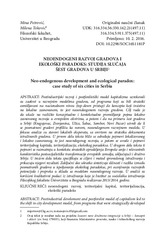Приказ основних података о документу
Neo-endogenous development and ecological paradox: case study of six cities in Serbia
| dc.creator | Petrović, Mina | |
| dc.creator | Toković, Milena | |
| dc.date.accessioned | 2021-10-12T12:19:31Z | |
| dc.date.available | 2021-10-12T12:19:31Z | |
| dc.date.issued | 2016 | |
| dc.identifier.issn | 0038-0318 | |
| dc.identifier.uri | http://reff.f.bg.ac.rs/handle/123456789/2162 | |
| dc.description.abstract | Postindustrial develoment and postfordist model of capitalism led to the shift in city development model, from programs that were strategically developed on a national level (top-down perspective) to a new concept that insists on locally based or neo - endogenous city development. The main aim of this paper is to shed light on a different conceptual and contextual approaches to the notion of the neo endogenous development in European context, and to give an answer to the question whether and how Serbian cities (Kragujevac, Zrenjanin, Uzice, Sabac, Sombor and Novi Pazar) are moving towards this new development model. Attitudes of local experts and city evelopment strategies are in the main anaytical focus. In the first part, concepts of localised and localy based or neoendogenous development are discussed and related to the concepts of territorial capital, teritorialization, ecological paradox. In the second part, these concepts are contextualised through discusson based on strategic commitments of the EU, and relevant characteristics of post- socialist transformation of European countries, including Serbian society. In the third part, the goals and method of conducted empirical research are stated, and the results presented. The final part briefly synthesises the similarities and differences in manifesting ecological paradox among the researched cities, which are related to the perceived development potentials and obstacles in acordance to neo - endogenous development model. The paper is informed by qualitative based on the survey research conducted by Institute for Sociological Research of University of Belgrade - Faculty of Philosophy in 2013/14. | en |
| dc.publisher | Sociološko udruženje Srbije i Crne Gore, Beograd i Univerzitet u Beogradu - Filozofski fakultet - Institut za sociološka istraživanja, Beograd | |
| dc.relation | info:eu-repo/grantAgreement/MESTD/Basic Research (BR or ON)/179035/RS// | |
| dc.rights | openAccess | |
| dc.rights.uri | https://creativecommons.org/licenses/by-nc/4.0/ | |
| dc.source | Sociologija | |
| dc.subject | territorial capital | en |
| dc.subject | teritorialization | en |
| dc.subject | neo - endogenous development | en |
| dc.subject | ecological paradox | en |
| dc.title | Neo-endogenous development and ecological paradox: case study of six cities in Serbia | en |
| dc.type | article | |
| dc.rights.license | BY-NC | |
| dc.citation.epage | 209 | |
| dc.citation.other | 58: 181-209 | |
| dc.citation.rank | M24 | |
| dc.citation.spage | 181 | |
| dc.citation.volume | 58 | |
| dc.identifier.doi | 10.2298/SOC16S1181P | |
| dc.identifier.fulltext | http://reff.f.bg.ac.rs/bitstream/id/945/2159.pdf | |
| dc.identifier.scopus | 2-s2.0-84965022449 | |
| dc.identifier.wos | 000416987300001 | |
| dc.type.version | publishedVersion |

